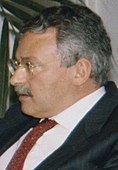| |||||||||||||||||||||||||||||||||
All 94 seats in the Assembly of Madrid 48 seats needed for a majority | |||||||||||||||||||||||||||||||||
|---|---|---|---|---|---|---|---|---|---|---|---|---|---|---|---|---|---|---|---|---|---|---|---|---|---|---|---|---|---|---|---|---|---|
| Opinion polls | |||||||||||||||||||||||||||||||||
| Registered | 3,381,610 | ||||||||||||||||||||||||||||||||
| Turnout | 2,356,925 (69.7%) | ||||||||||||||||||||||||||||||||
| |||||||||||||||||||||||||||||||||
| |||||||||||||||||||||||||||||||||
The 1983 Madrilenian regional election was held on Sunday, 8 May 1983, to elect the 1st Assembly of the Autonomous Community of Madrid. All 94 seats in the Assembly were up for election. The election was held simultaneously with regional elections in twelve other autonomous communities and local elections all throughout Spain.
The election resulted in a landslide victory for the Spanish Socialist Workers' Party (PSOE), the only time to date the party has achieved this in a Madrilenian regional election. The People's Coalition, an electoral alliance formed by the People's Alliance (AP), the People's Democratic Party (PDP) and the Liberal Union (UL), emerged as the second largest group in the Assembly, whereas the Communist Party of Spain (PCE) improved on its 1982 results in the region and secured 9 seats with 8.8% of the vote.[1] The result ensured Socialist Joaquín Leguina would become the first President of the Community of Madrid,[2][3] though the PSOE showed a willingness in collaborating with the PCE.[4]
- ^ "Mayoría absoluta del PSOE en la Comunidad de Madrid". El País (in Spanish). 10 May 1983. Retrieved 11 December 2019.
- ^ "Joaquín Leguina inicia los contactos para formar el primer Gobierno de la Comunidad de Madrid". El País (in Spanish). 10 May 1983. Retrieved 11 December 2019.
- ^ "Leguina, elegido con los 51 votos del PSOE primer presidente de la comunidad autónoma". El País (in Spanish). 15 June 1983. Retrieved 11 December 2019.
- ^ "El PSOE propone al PCE pactos en el Gobierno autónomo". El País (in Spanish). 7 June 1983. Retrieved 11 December 2019.

